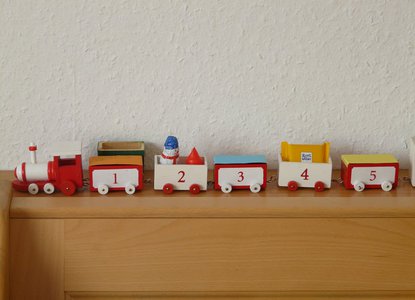Poetry might sound a bit scary, but you will already have introduced your child to poetry. The nursery rhymes and lullabies you sing, or listen to, to calm your child or play games with them, and even the music they hear on the radio in the car have all been introducing your child to poetry from the very start of their life.
Introducing more poetry will build on those starting points. Research shows the strong link between baby’s and children’s experiences of hearing and joining in with rhymes and poetry, and its positive impact on their communication and writing skills.
Why poetry?
- Reading poetry together can strengthen the bond you have with your child as you find poems, rhymes, and songs that you both enjoy, and that support their play, or routine times of the day.
- Poetry can build children’s vocabulary.
- Repetition of poems and rhymes will support building of memory.
- Poetry can support children to develop control of the volume and tone of their voice.
- Poems with actions support coordination and balance.
- Poetry can support children to hear sounds in words.
- Poems can support children’s awareness of different feelings and emotions, both through the content of the poem and the effect poetry has on how children feel. For example, lullabies to soothe and action rhymes to excite.
Tips for introducing poetry to your child:
- Continue to sing and listen to rhymes and songs with your child. The more, the better.
- Repeating simple interactive rhymes will encourage eye contact and early vocalisations. For example, Round and round the garden or Row, row, row your boat.
- Introduce actions to rhymes, make sure you join in with them too. For example, Dingle, dangle scarecrow or Head, shoulders, knees and toes.
- When you introduce a new poem or rhyme, repeating it frequently will really support your child to begin to anticipate what comes next, and understand it. If you can, bring it alive, for example your child will enjoy and understand a poem about the rain best on a rainy day!
- You could visit the library and borrow some books which include rhymes, or borrow a poetry anthology.
- Poetry anthologies are fun to explore together, let your child choose a few poems to read, and consider which ones are yours and your child’s favourites. You could read a poem a day as part of your bedtime routine, or while you’re eating breakfast.
- Choose poems that feature your child’s interests, for example, rocket or dinosaur poems.
- Poems can also be used to help children to follow instructions and understand routine times of the day. You could find or make up your own poem to say at bedtime as you say goodnight, or maybe one about getting dressed in the morning.
More inspiration
Explore the nursery rhyme content on Words for Life or check out the Nursery rhymes on BBC Tiny Happy People.




